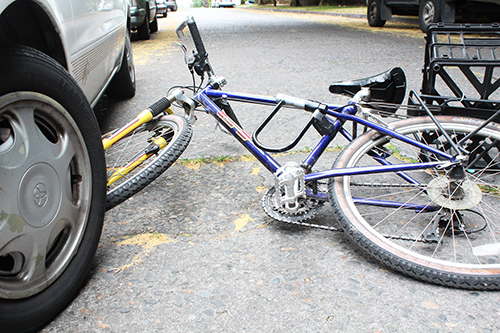A Portland cyclist has filed a lawsuit for $10,000 for injuries she received from a collision with a police car, prompting me to once again wonder how exactly the police uphold traffic laws and safety measures. I also wonder why this woman was riding a $750 beach cruiser on the sidewalk of one of the least-safe streets in the city.
Street smarts

A Portland cyclist has filed a lawsuit for $10,000 for injuries she received from a collision with a police car, prompting me to once again wonder how exactly the police uphold traffic laws and safety measures. I also wonder why this woman was riding a $750 beach cruiser on the sidewalk of one of the least-safe streets in the city.
Any city-smart cyclist, or any who has ridden their bike around the North or Northeast neighborhoods, should know that there are bike thoroughfares on either side of both of the area’s busiest streets: Alberta and Killingsworth. Bike safety is not a difficult concept to grasp, and a beach cruiser does not cruise that speedily.
Haley Miller, the 28-year-old pilot of the steel horse in question, decided to ride against the flow of traffic on the sidewalk. Presumably, she intended to roll toward the crosswalk instead of taking Northeast Sixth Avenue, a through street behind the area from which safe routes can be accessed.
At an undetermined speed, at the sidewalk indent, she was clipped by James Habkirk, who has been an officer with the Portland Police Bureau for 19 years. It’s unclear which party was responsible for the crash, however the finger tends to point toward Habkirk when one evaluates the amount of damage that the complainant and the bicycle suffered.
Miller claims that the crash demolished her $750 Schwinn beach cruiser and incurred $3,860 in medical bills for injuries to her neck, shoulders and leg. Some of these injuries have been deemed “permanent,” her suit says. Talk about an expensive and painful accident. How fast could she have been going while leaving the next-door post office?
How did she get so injured traveling at a slow pace toward the opening of the parking lot? Unless she pedaled like a lunatic toward the corner of MLK, she should have been rockin’ slower than a rusted, sandy Schwinn at top speed on a boardwalk.
Habkirk, who was responding to a burglary call, claims to have looked both ways before inching forward onto the sidewalk. This doesn’t seem to be the case. His only other explanation for the crash was that the cyclist had no lights. It was 9 a.m. You do not need lights when it isn’t dark. But, as we all know, the word of the officer in his report is considered before the statements of the cyclist.
The lawsuit is assuredly leaning in Habkirk’s favor, considering the fact that he is still working in the same precinct and has been since the incident. In any other circumstance, with any other job that requires driving, Habkirk would have been kicked to the curb faster than Miller’s ricochet off his front left bumper.
Undoubtedly, Habkirk’s veteran status with the police force has some bearing on the weight of his claims in this lawsuit, in accordance with a governmental view. He also stated that Miller claimed she was uninjured at the time of the accident—right before Habkirk called the paramedics.
If Miller’s bike was demolished and her injuries so bad that they incurred almost $4,000 worth of medical bills, shouldn’t a veteran officer of the police know immediately that the woman needed help?
Or is the issue the animosity between dueling legal parties—the common folk who hold a grudge against authoritative and oppressive stations, and the police who are so used to their status above the law that they entertain a lack of care and must cover up their legal boo-boos?
Both these parties are at fault. Miller should have been paying attention to where she was riding, or avoided riding on the sidewalk in the wrong direction. Habkirk should have looked both ways, or known that he should be setting an example of safe driving even while rushing to a possible burglary.
Common knowledge tells us to look both ways before crossing the street. This is an absurd tragicomic insight into how people cannot pay attention to even the simplest facts of life. Hopefully more people decide to ride their bikes in the bike lane, and hopefully next time the police can make it out of the precinct before they hurt anybody.






